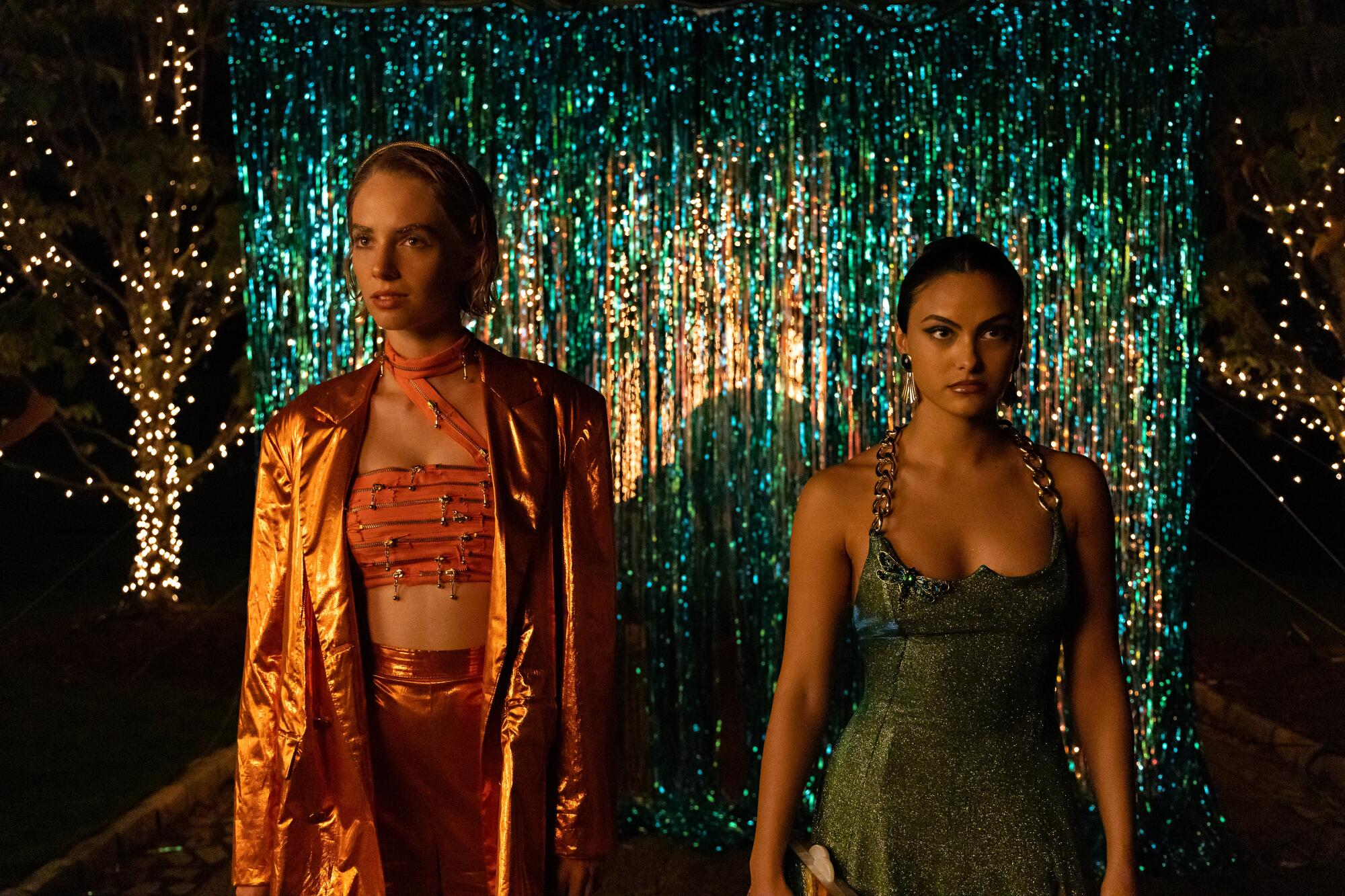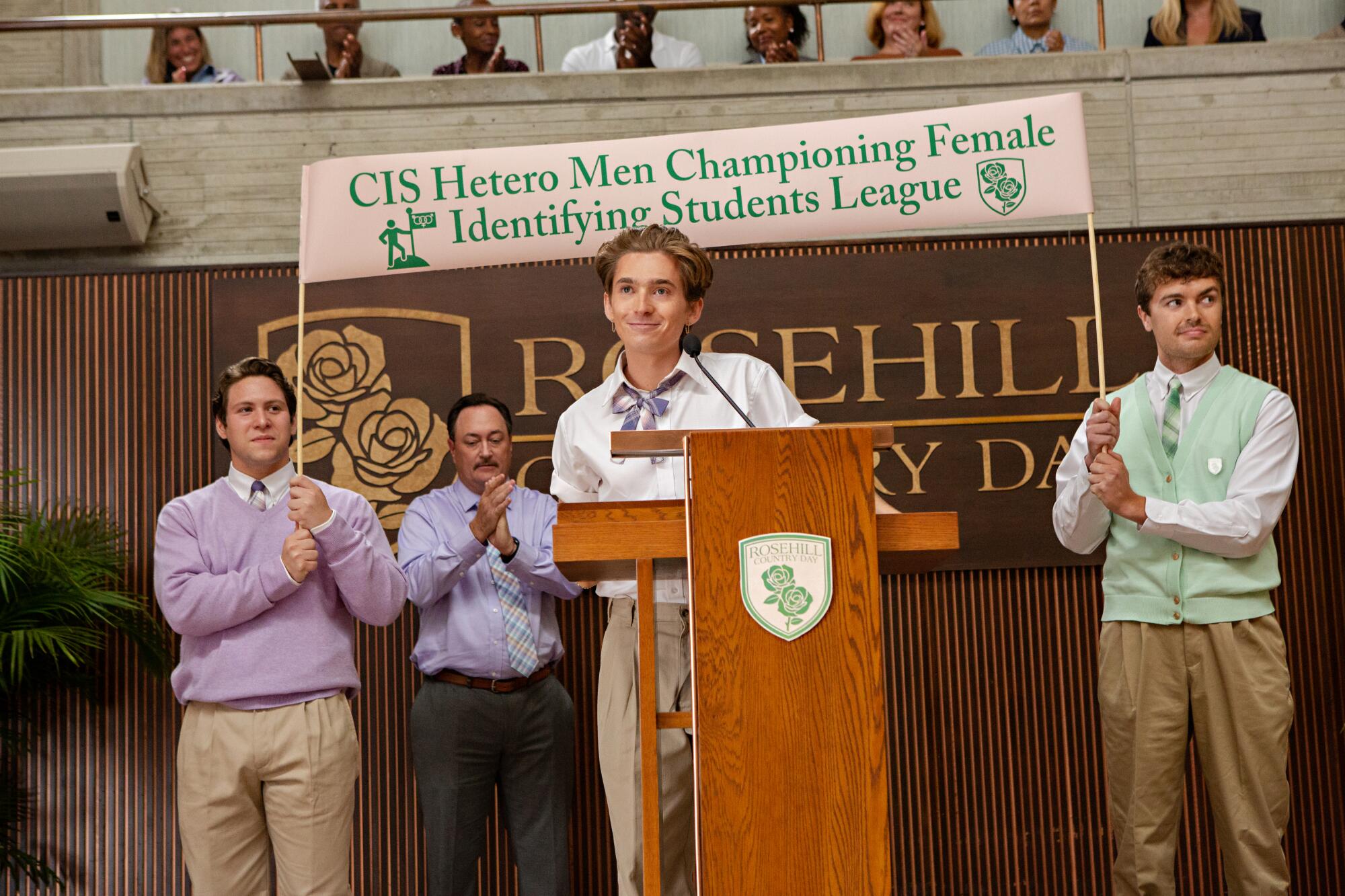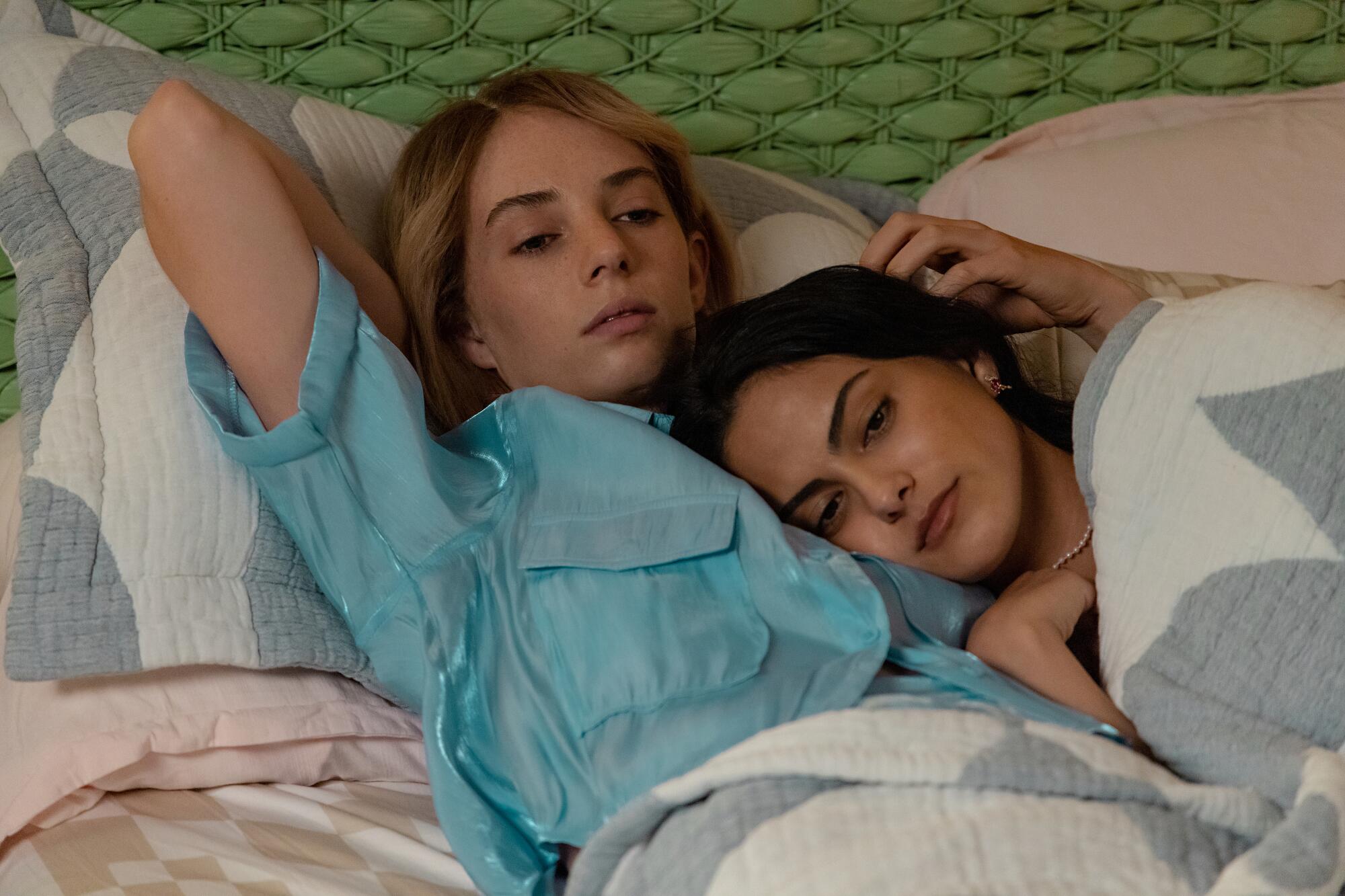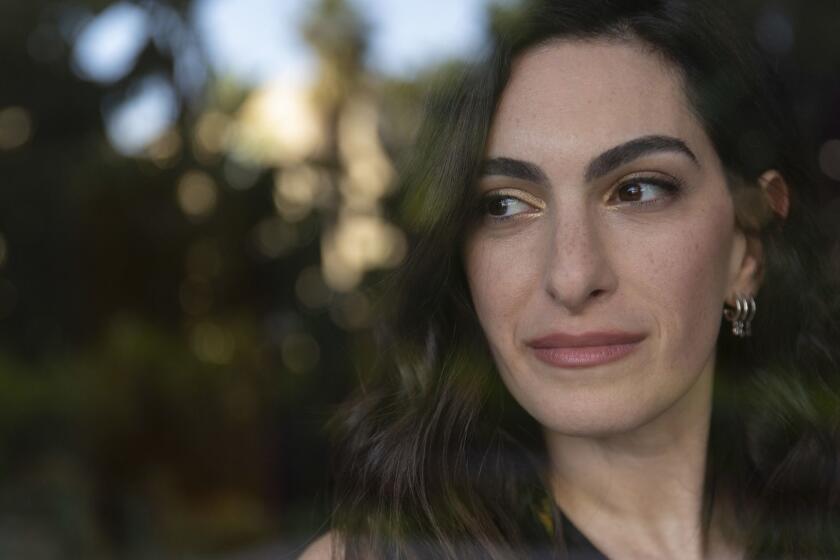- Share via

“There is truly no one scarier than a teenage girl,” says writer-director Jennifer Kaytin Robinson (“Sweet/Vicious,” “Someone Great”) who puts that premise to the test in her second feature, “Do Revenge,” a barbed Gen Z black comedy starring Camila Mendes (“Riverdale”) and Maya Hawke (“Stranger Things”).
On Netflix Friday, “Do Revenge” stars Mendes as popular Drea opposite Hawke’s awkward Eleanor, who meet at tennis camp and make a pact, “Strangers on a Train”-style: each girl will take down the other’s bullies — the better to claim plausible deniability while watching their entitled rich-kid enemies go down in flames.
Machiavellian schemes and betrayals galore ensue in the nimble two-hander, whose brightly textured world nods to the ‘90s teen movies, like “Clueless,” “Cruel Intentions” and “Jawbreaker,” that influenced Robinson. But so do moments of connection and vulnerability, as the co-conspirators become fast friends, and bitter frenemies, when their vengeance quest careens out of control.
“I could lie and say that I saw a Scorsese movie or ‘Jaws’ at a formative age, but I saw ‘Clueless’ at a formative age, and it made me want to make movies,” said Robinson, who also co-wrote this year’s “Thor: Love and Thunder.” “I don’t know if this is a conversation I need to have with my therapist but I really respond to the pain of being a young woman and growing up, and the feelings that go along with that.”

Mendes fell in love with the script and scored a self-tape assist from her “Riverdale” co-stars Lili Reinhart and Madelaine Petsch, with whom she was quarantining ahead of the show’s fifth season. “I had nothing but time and resources and I had my two co-stars with me and we were all just watching ‘Harry Potter’ movies all week,” she said. It took three minutes watching her audition for Robinson to cast her in the part.
Reading together over Zoom, she and Hawke struck an instant chemistry. But after coordinating the film’s shoot around their respective TV shows, a shift in the “Stranger Things” schedule meant Hawke nearly had to drop out — until production moved from Los Angeles to Atlanta so she could film both projects simultaneously.
“Everyone saw Season 4 of ‘Stranger Things.’ It wasn’t like she was going there and doing light work,” said Robinson. “I’d be like, what you do today? She’d say, ‘Oh, I was in a bat fight.’ I think it’s a testament to the two of them that you cannot tell how hard it was... They’ve done such a beautiful job bringing these two teenage girl characters to life, but never making it feel like they are just teenage girls. The characters didn’t come alive until they lived inside of them.”
Ahead of the film’s release, the stars hopped on a video chat — Mendes from home, Hawke from Robinson’s house — and dove into the relatable “dark desire” for revenge and the power within their morally fluid heroines.
“Do Revenge” takes this Hitchcockian premise and establishes it in its own larger-than-life teenage world. What helped you make Drea and Eleanor feel like real, living, breathing young women in this setting?

Maya Hawke: I think that these days there is this real tendency to have someone be a good guy — and good guys don’t make bad decisions. The bad guys almost never make a good decision. They get limited opportunities to exist outside of their paradigm. And what I loved about the script for both of our characters is that they felt like real people to me, in my experience of real people, which is that there are no good guys and there are no bad guys. There are complicated people with complicated motivations who sometimes hurt others and sometimes hurt themselves, and sometimes love others, and sometimes love themselves. That was one of the things that excited me the most.
Camila Mendes: Maya and I have talked a lot about how we’re both on shows where we play heroes in some way or another, and Drea and Eleanor are flawed heroes. I feel like I’ve been Drea at low points in my life, where I’ve been vengeful or I’ve wanted to hurt somebody who hurt me, and I’ve felt motivated by those same dark desires. And I think that’s way more relatable and interesting to see unfold in a character arc than to see this perfect idea of a person. And oftentimes these heroic characters in films, their flaw is almost a backhanded compliment.
Hawke: I love that! “Their flaw is a backhanded compliment.”
Mendes: It’s almost like their flaws are still positive attributes. Like, “I just love too hard” or, “My tragic flaw is that I care too much!” I don’t think that’s the case with Drea and Eleanor. They get to be villains in their own way. And I think ultimately those are the lessons that they learn from.
The world underestimates teenage girls all the time, but this movie doesn’t — Drea and Eleanor are at times smart, sweet, calculating, righteous and imperfect. They can both see the world very clearly. Where did it feel gratifying to find the power within your characters?

Mendes: Their intelligence is their power. In some ways, that’s why I respect them. Even though they’re doing nasty things, they’re thinkers and they’re scheming together and there’s something very smart about them, even though they’re doing really dumb s—.
Hawke: It’s true! I’ve had that thought in life, and about this movie. Every now and then someone has hurt my feelings, and the way they hurt my feelings, I had to be like, “Gosh, you’re so smart. You hurt my feelings in the exact way that my feelings can be hurt.” Sometimes someone does something to you that doesn’t look that bad on the surface, but really hits your soft spot ... nothing worse than a smart enemy.
The fight that we have was one of my favorite scenes to film. Both of our arguments are really strong. And this is credit to Jenn’s writing and directing, to set up a scene where you have two characters you’ve been following and they both have a very strong opinion about what’s happened, and as an audience member, neither one is right and neither one is wrong.
Mendes: Every person is a villain in somebody else’s story.
Hawke: It feels so connected to what’s happening culturally today in the way that every group has their villains. Everyone is so incapable of really empathizing with someone else’s experience and understanding. We’re not good story-hoppers. That’s why movies and art are so important. Because for some reason, when we’re in the third-person perspective, we can relate to and understand people’s experience better. But when we’re in the scene of our own lives, we’re like, “No! It’s my story.”

There is one arguably more villainous character in the movie: Max (Austin Abrams), Drea’s ex, whom she describes as a “fake woke misogynist hypocrite” after he leaks her sex tape.
Mendes: I love this idea of the kind of villain that Max is, because he’s not the overt villain type. He’s this 2022 woke villain. And there’s so many of those guys running rampant —
Hawke: Boys.
Mendes: — especially through Hollywood! It’s a new kind of evil that exists in the world: the person who presents themselves as a feminist, a man who supports women and whatnot, but behind closed doors is actually quite the opposite.
Jennifer Kaytin Robinson has lived on the precipice of fame, always this-close to making it.
You were both coming off of hugely successful shows when you were cast in this. How were you looking to stretch between seasons when “Do Revenge” came along?
Hawke: People always are asking, at least at this stage of life, “What do you want to do next?” I just want to work with people who love what they are doing, and on writing that’s good. I want to keep getting to act, and I would really like to do it with amazing people who care about what they’re making. The second I realized that this movie was going to be that, getting to work with amazing people who really care about it, it didn’t matter if I’d be playing a bush or a lamp post or a keychain.
Mendes: By the time I got this audition, we were already in our time jump on “Riverdale” playing our characters in our 20s. I was 26 when I got the part. I didn’t think I would ever do something like that again. I was like, “I’m done with high school movies!” And then I read this. It doesn’t feel like a high school movie because it’s not really about being in high school as much as it is about working through your trauma as a teenager. It wasn’t about whether or not this is the right next step. It was just like, “This is just a really cool project and I want to be in it, and like I don’t give a f— that I’m 26 playing in high school. They’ll get over it.”
Hawke: That’s how I felt. When you read something really good, there’s no strategy anymore.

Maya, to do this film you ran back and forth between the “Do Revenge” set and the “Stranger Things” set. What made it worth tackling these two big jobs at once?
Hawke: As much as I was running around from bats to, like, bitches on this adventure, I think it was really hardest on Jenn and Cami. It put a lot of pressure on the schedule and basically every day we had to get through by the skin of our teeth. We could never make a change, because the dominoes that would fall were so many. It never crossed my mind for a second not to do everything in my power to make this work.
Mendes: It was very hard on you [Maya]. I could see that you were running from a long day on “Stranger Things” to another long day on “Do Revenge,” then back to a long day on “Stranger Things.” The work she put in to both projects simultaneously was so impressive, and the fact that every time she showed up to work I didn’t see the exhaustion. Your temperament through all of that was so impressive, and not a lot of people can pull that off.
Hawke: We both shed a lot of tears on set in many different moments! It was a big undertaking and touched a lot of soft spaces in our hearts. And I think all three of us and everyone else involved cared so much about making it as good as it could be. Letting the movie meet its potential, which is probably my greatest fear in life around everything: I don’t care if I’m the worst actor in the history of America or the best, I just want to be the best actor I could be. I feel like we were all constantly being like, are we doing our best?
This movie and its making seem like a deeply philosophical jumping-off point for conversation about how to live your life.
Hawke: Jenn has a way of making really complicated ideas deeply accessible. Sometimes, even if you’re making a serious art film, the conversations around the movie aren’t always as interesting because the deep ideas within the film aren’t as accessible. And I think the special thing about this movie is that it really is wrestling with powerful philosophical and moral questions, but it wrestles with them in a way that would spark thoughts and feelings in a fifth-grader, a 16-year-old, a 30-year-old and your grandma. And that is freaking cool.
More to Read
Only good movies
Get the Indie Focus newsletter, Mark Olsen's weekly guide to the world of cinema.
You may occasionally receive promotional content from the Los Angeles Times.












